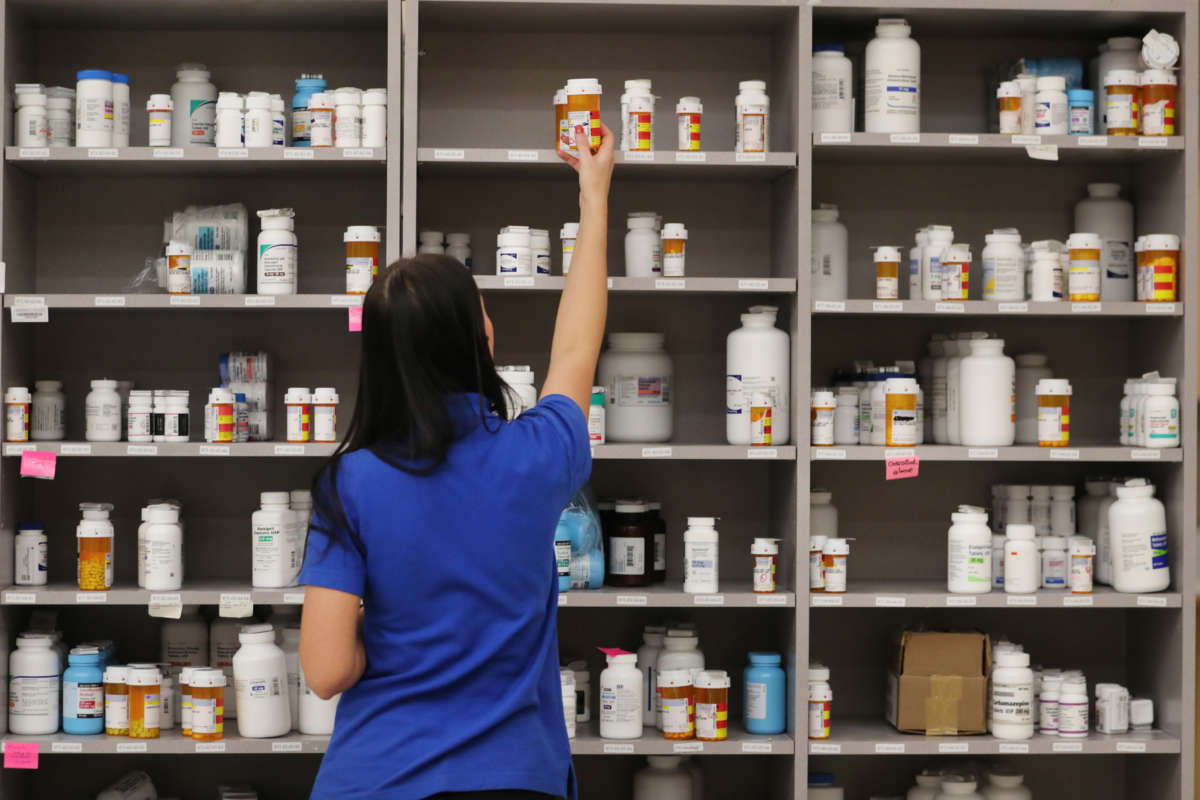Honest, paywall-free news is rare. Please support our boldly independent journalism with a donation of any size.
The pharmaceutical industry is mobilizing its army of Capitol Hill lobbyists in a last-ditch bid to tank Senate Democrats’ effort to cut prescription drug costs with legislation that would, for the first time, require Medicare to directly negotiate the prices of a small number of medications.
While Democrats’ latest drug pricing plan is highly modest and limited in scope, applying to far fewer medicines than progressives wanted, advocates say it’s an important first step toward curbing the pharmaceutical industry’s unchecked ability to set prices as it pleases, a dynamic that has resulted in exorbitant costs for patients and the federal government.
This year alone, drug companies in the U.S. have hiked prices on their products more than 1,180 times. The federal government is the largest purchaser of prescription drugs in the U.S., and spending by Medicare Part D — the prescription medicine benefit provided through private plans — has surged in recent years.
The pharmaceutical industry has long fervently opposed any attempt to regulate its pricing power, a trend that’s continuing with Senate Democrats’ new proposal, which was principally negotiated by Senate Majority Leader Chuck Schumer (D-N.Y.) and Sen. Joe Manchin (D-W.Va.) — a necessary swing vote in the upper chamber.
The Washington Post reported Wednesday that “when Democrats started drafting the multitrillion-dollar social spending bill known as the Build Back Better Act last year, much of corporate America — the oil-and-gas industry, private equity, the farm lobby — fought against policies that would harm their interests.”
“Now that Democrats have decided to try to pass a bill that includes only the two provisions Manchin has agreed to advance — prescription drug pricing and extending Affordable Care Act subsidies — the powerful pharmaceutical industry is fighting a lonely battle to stop it,” the newspaper noted. “The pharmaceutical lobby’s strategy is built on making the case to Senate Democrats that the bill won’t do as much as the leaders claim to reduce prices for consumers, according to three Democratic lobbyists and a person familiar with the effort.”
But as David Mitchell, the founder of Patients for Affordable Drugs, notes, the pharma and biotech industries are sending contradictory messages, in some cases claiming the bill would control costs so aggressively that it would dampen innovation — a common talking point.
Dr. Michelle McMurry, CEO of the Biotechnology Innovation Organization — the world’s largest biotech trade group — declared that the proposal unveiled by Senate Democrats earlier this month “could propel us light years back into the dark ages of biomedical research.”
“BIO will continue to work alongside lawmakers and the current Administration to find real solutions that help patients and achieve our vision for a healthier, more equitable America,” McMurry added.
Shadowy industry groups are also running new ads against the proposed legislation, falsely claiming it would harm Medicare and the program’s beneficiaries:
A new group, American Prosperity Alliance, is spending heavy on TV with an anti-inflation ad that condemns Dems for trying to lower drug prices, which is deflationary. The $300 billion medicare cut is price savings. Voters are being played. https://t.co/OiDrqRKxlq
— michaelscherer (@michaelscherer) July 20, 2022
To patient advocates, the industry’s alarmist protests against Democrats’ compromise proposal are nothing more than a desperate attempt to preserve its outsized profit margins at the expense of people’s health.
“Big Pharma is fighting hard to keep their price-setting monopoly intact,” said Lower Drug Prices Now, a national coalition of progressive advocacy groups and labor unions. “They’re too late. We’re steps away from seeing Medicare able to negotiate for lower drug prices.”
“Congress: get it done,” the coalition added.
Letting Medicare negotiate drug prices directly with pharmaceutical companies — something it is currently barred from doing under federal law — is a hugely popular idea with the public, but past efforts to give the program that authority have been thwarted by the pharma lobby and its allies in Congress.
At present, the pharmaceutical industry boasts more than 1,400 registered lobbyists, far outnumbering members of Congress. According to recent research by the watchdog group Accountable.US, the five biggest drug companies in the U.S. have spent nearly $150 million combined during the pandemic to kill drug pricing reform.
As Bloomberg’s Robert Langreth wrote earlier this week, “When prescription-drug benefits were added to Medicare under a 2003 law, the pharmaceutical industry successfully lobbied to prohibit the federal government from using its huge purchasing power to negotiate drug prices.”
“In the U.S.,” Langreth observed, “patients directly pay about 13% of prescription medicine costs out of their own pockets. In one survey, one in five adults in the U.S. said they failed to complete a prescribed course of medicine because of cost. The figure was one in 10 in Germany, Canada, and Australia.”
Mitchell of Patients for Affordable Drugs warned Wednesday that “drug companies will keep inflicting their predatory pricing power on Americans until we pass legislation to stop them.”
Press freedom is under attack
As Trump cracks down on political speech, independent media is increasingly necessary.
Truthout produces reporting you won’t see in the mainstream: journalism from the frontlines of global conflict, interviews with grassroots movement leaders, high-quality legal analysis and more.
Our work is possible thanks to reader support. Help Truthout catalyze change and social justice — make a tax-deductible monthly or one-time donation today.
